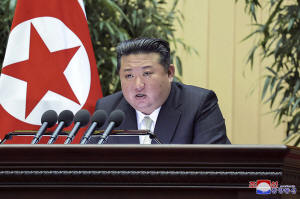North Korean leader calls for expanding his nuclear forces in the face
of alleged US threats
 Send a link to a friend
Send a link to a friend
 [November 18, 2024]
By KIM TONG-HYUNG [November 18, 2024]
By KIM TONG-HYUNG
SEOUL, South Korea (AP) — North Korean leader Kim Jong Un renewed his
call for a “limitless” expansion of his military nuclear program to
counter U.S.-led threats in comments reported Monday that were his first
direct criticism toward Washington since Donald Trump’s win in the U.S.
presidential election.
At a conference with army officials on Friday, Kim condemned the United
States for updating its nuclear deterrence strategies with South Korea
and solidifying three-way military cooperation involving Japan, which he
portrayed as an “Asian NATO” that was escalating tensions and
instability in the region.
Kim also criticized the United States over its support of Ukraine
against a prolonged Russian invasion. He insisted that Washington and
its Western allies were using Ukraine as their “shock troops” to wage a
war against Moscow and expand the scope of U.S. military influence, the
North’s official Korean Central News Agency said.
Kim has prioritized his country’s ties to Russia in recent months,
embracing the idea of a “new Cold War” and displaying a united front in
Russian President Vladimir Putin’s broader conflicts with the West.
He has used Russia’s war on Ukraine as a distraction to accelerate the
development of his nuclear-armed military, which now has various
nuclear-capable systems targeting South Korea and intercontinental
ballistic missiles that can potentially reach the U.S. mainland.
Kim has yet to directly acknowledge that he has been providing military
equipment and troops to Russia to support its war against Ukraine and
the KCNA’s report didn’t mention whether Kim made any comments toward
Trump, whose election win has yet to be reported in the North’s state
media.

Kim met Trump three times in 2018 and 2019 in Trump’s first presidency,
but their diplomacy quickly collapsed over disagreements in exchanging
the release of U.S.-led sanctions and North Korean steps to wind down
its nuclear and missile program. North Korea has since suspended any
meaningful talks with Washington and Seoul as Kim ramped up his testing
activity and military demonstrations in the face of what he portrayed as
“gangster-like U.S. threats.” There’s concern in Seoul that Kim in
exchange for his military support of Russia would receive Russian
technology in return to further develop his arsenal.
Trump’s election win has touched off speculation about a resumption of a
summit-driven diplomacy with Kim, which was described by critics as a “bromance.”
But some experts say a quick return to 2018 is highly unlikely, as too
much has changed about the regional security situation and broader
geopolitics since then.
[to top of second column]
|

In this photo provided by the North Korean government, North Korean
leader Kim Jong Un delivers a speech during a meeting in Pyongyang,
North Korea, on Nov. 15, 2024. Independent journalists were not
given access to cover the event depicted in this image distributed
by the North Korean government. The content of this image is as
provided and cannot be independently verified. Korean language
watermark on image as provided by source reads: "KCNA" which is the
abbreviation for Korean Central News Agency. (Korean Central News
Agency/Korea News Service via AP)

While the North Korean nuclear problem was relatively an independent
issue during Trump’s first term, it is now connected with broader
challenges created by Russia’s war on Ukraine and further
complicated by weakened sanctions enforcement against Pyongyang,
Hwang Ildo, a professor at South Korea’s National Diplomatic
Academy, wrote in a study last week.
North Korea’s nuclear and missile program is now much more advanced,
which would increase Kim’s perception of his bargaining powers.
Kim’s efforts to boost North Korea’s presence in a united front
against Washington could also gain strength if Trump spikes tariffs
and rekindles a trade war with China, the North’s main ally and
economic lifeline, Hwang said.
Amid the stalemate in larger nuclear negotiations with Washington,
Kim has been dialing up pressure on South Korea, abandoning his
country’s long-standing goal of inter-Korean reconciliation and
verbally threatening to attack the South with nukes if provoked.
Kim has also engaged in psychological and electronic warfare against
South Korea, such as flying thousands of balloons to drop trash in
the South and disrupting GPS signals from border areas near the
South’s biggest airport.
South Korea’s Joint Chiefs of Staff said North Korea again flew
trash-laden balloons toward the South early Monday and issued a
statement warning the North “not to test our military’s patience any
further.” The North has launched about 7,000 balloons toward the
South since May, causing property damage but so far no injuries. On
at least two occasions, trash carried by North Korea’s balloons fell
on Seoul’s presidential compound, raising concerns about the
vulnerability of key sites.
All contents © copyright 2024 Associated Press. All rights reserved
 |